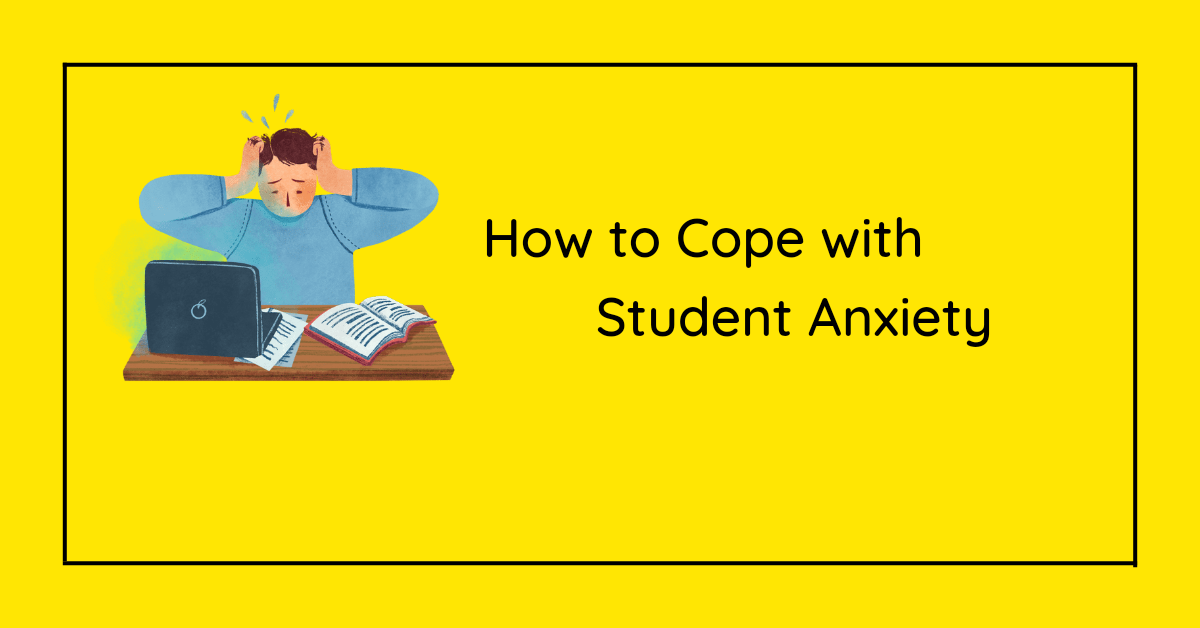We know anxiety is more than just “worries”. It can influence classroom performance just as much any other learning disability. Anyone who is worried and anxious isn’t doing it on purpose, the nervous system is acting automatically. That’s why “just relax” or “calm down” won’t be doing wonders.
As a student you’ve got a lot on your plate so sometimes stress can get in the way of this juggling act. Normal levels of stress from time to time are expected and can sometimes be beneficial depending on the circumstances. But, when stress continues at unhealthy levels for an extended period, it can impact studying, concentration and self esteem. When not properly treated, stress affects all aspects of daily life. It can prevent students from reaching their academic goals, which can then lead to developing anxiety or other mental health conditions.
Although often used interchangeably, stress and anxiety have a couple of differences.
Physical Symptoms of stress include:
- Headache, dizziness or shaking
- Chest pains or racing heart
- Muscle tension or jaw clenching
- Aches and pains
- Trouble sleeping or exhaustion
- High blood pressure
- Weakened immune system
Physical symptoms of anxiety include:
- Stomach pain, nausea or digestive issues
- Headache
- Insomnia or waking up frequently
- Weakness or fatigue
- Pounding or racing heart
- Rapid breathing or shortness of breath
- Sweating, trembling or shaking
- Muscle tension
When you recognize that you have become overwhelmed with stress or anxiety are struggling to work through solutions, it’s a good time to ask for help or adopt strategies to help you manage your triggers more effectively.
Exercise
‘Regular exercise can help relieve stress in many ways.’ There is breathing centered exercise like yoga, which is good for grounding and breathing management. Aerobic exercise can equally manage stress hormones, release tension and increase endorphin levels creating a ‘feel good’ vibe. Sports and activities can add a social dimension that can additionally support someone with stress management, as we know that social engagement benefits our mental health and wellbeing.
Mindfulness
A relaxation technique originating in Buddhism, mindfulness is a popular coping mechanism for those tackling stress or anxiety. One of the most accessible ways to practice this is through the use of free smartphone apps. There is evidence that regular practice can improve the body’s response to stress and anxiety.
Talking to someone
Isolation can have an extremely negative impact on your happiness. Accepting that you need help and talking to someone is the first step to feeling better.
Talking about what is stressing you out can be useful. Try to be clear on whether you are looking for advice or just need someone to listen.
Speak to your friends and family- they know you best and care about you the most.
Time management
Do you ever feel like there aren’t enough hours in a day? Well you aren’t alone. We often get stressed when they feel that they are running out of time to complete a task. However, simple time management techniques can help you to feel more relaxed and focused.
Try creating a written schedule, breaking your tasks down into manageable chunks, planning accordingly and allocating yourself time everyday to relax.
Getting enough sleep
This might sounds like an obvious solution but it’s often overlooked. Your mental health and wellbeing relies on you getting enough sleep, as we can’t function at 100% when we are tired.
Try to wake up and go to sleep at the same time each day. This might not be realistic every night but aim towards this goal more often than not.
Sleep is important for recuperating the body’s systems and allowing us to process. If we don’t get enough sleep, this can make us more irritable, impact on our concentration, coordination and make us more vulnerable to mental health problems.
Other stress-busting methods:
- Take your mind off it. Do something you enjoy and that will distract you for a while like listening to music, reading etc.
- Eat healthy and consume fresh food.
- Change your mindset and adopt a positive attitude.
- Take a break from social media. Comparing yourself and your productivity to others is a recipe for disaster.
- Laugh (It’s a lame one). But yes laughing out loud actually increases oxygen and blood flow, which immediately reduces stress. So spending time with a funny friend might help.
Article by Avantika Gurjar


